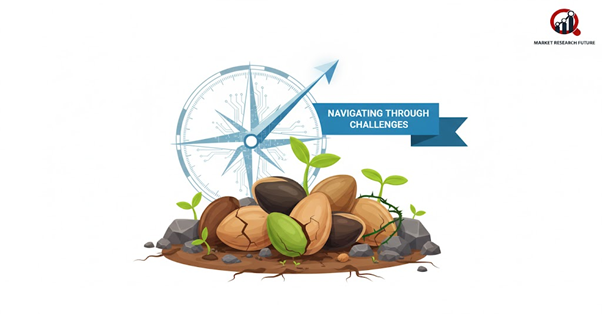Seeds - Navigating Through Challenges

The Seed Market Overview
Technological trends, pertaining to the sophistication of seeds, are shaping the global seeds market. The size of the competitive space, hence, is expected to reach USD 99.84 billion by 2035. Owing to a sluggish advancement pace of 3.85% through 2035, the ecosystem will rise from USD 65.88 billion in 2024.
The seed industry faces numerous challenges, including regulatory changes affecting the processing and availability of domestically produced seed varieties and the increasing footprint of global competition for limited export opportunities.
While these factors are not new to the agriculture industry, they have been intensified by a declining global economy triggered by overproduction in several key agricultural commodities, which has reduced demand.
This post explores some of these challenges, what they mean for both producers and consumers, how we can work together to address them, and what steps are needed to ensure the agricultural sector continues thriving in the future.
Consumer Challenges
Seeds are at the center of several consumer concerns related to health, food security, and environmental protection.
For instance, when processed foods contain ingredients that have been genetically modified (GM) or are derived from genetically modified organisms (GMOs), consumers often want to know if GM ingredients are present in their food.
GMOs have been used in agriculture since the mid-1980s, so any time a consumer encounters an unfamiliar ingredient, there’s a chance it may have been derived from GM seed.
Similarly, many consumers prefer food from organic farms that have not been treated with pesticides or other chemicals. It’s important for consumers to understand that there is no scientific proof that GM products are harmful to health.
As a seed company committed to sustainability, we believe that seed producers and farmers should be free to use the seeds they believe are best suited to their operations. Farmers should also be empowered to make their own business decisions regarding crop cultivation.
Producer Challenges
Although seeds may appear to be a small part of the agricultural production chain, they are essential to the economy and food production. Seeds can dramatically reduce production costs for farmers, which in turn impacts food affordability.
For example, a 2010 Farm Foundation study found that increased yields from crop genetics improved food security by about 50% in developing countries.
In Canada, multiple studies have shown that agricultural productivity increased by between $30 and $50 per acre when farmers used new technologies such as precision farming or herbicide-tolerant seed varieties.
Alongside production benefits, seeds also offer environmental advantages, reducing waste and protecting the soil from erosion and runoff.
Producing local seed is both sustainable and efficient, as it requires less fuel, fewer land parcels, and results in lower greenhouse gas emissions. Globally, more than one million hectares of land are dedicated to growing crops for seed production.
In addition to environmental benefits, the Canadian seed industry has created thousands of high-quality jobs and generates substantial export revenue for farmers.
Seed production has also boosted employment in traditional areas such as engineering, finance, marketing, distribution, storage, and transportation. The industry now directly employs about 6,000 Canadians, roughly one in five of all agricultural jobs nationwide.
Collaboration is Key
A growing group of stakeholders recognizes the need for collaboration between farmers, seed companies, and consumers to overcome these challenges. Here are some key recommendations:
- Recognize that GM products can play an important role in a diverse food system that also includes organic foods.
- Provide consumers with transparent information about which foods contain GM ingredients and which do not.
Regional Analysis
The global seeds market shows strong regional dynamics. North America remains a dominant player, supported by technological innovation and the widespread adoption of GM crops in the United States and Canada.
Europe follows closely, focusing on sustainability and organic farming, with strict regulations around GM seeds shaping the market structure. The Asia-Pacific region is rapidly emerging as a growth hub, driven by expanding agricultural activities in India, China, and Southeast Asia.
Increasing investments in hybrid seeds and biotechnology are fueling this expansion. Meanwhile, Latin America, particularly Brazil and Argentina, benefits from vast arable land and favorable climatic conditions for seed production.
In Africa, rising government initiatives and international collaborations are gradually enhancing local seed production capacity, contributing to food security and regional agricultural growth.

Leave a Comment